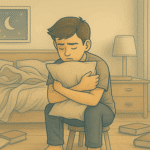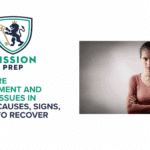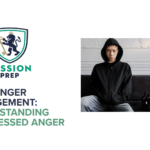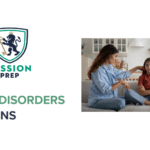Healthy Relationships for Teens: Anger Management for Peer Group Issues

Relationships are built on trust, respect, and open communication. But what if anger issues make this feel impossible? This is the unfortunate reality for almost two-thirds of U.S. teens.1
Anger issues can cause many problems for teens, often leading to isolation, rejection, and low self-esteem. They can also affect a teen’s sleeping patterns, physical health, and emotional well-being.
So, anger issues are a big problem. Fortunately though, there are ways teens (and their families) can get support. On this page, we’ll discuss teen anger in relationships and peer groups in depth, as well as:
The symptoms and signs of anger affecting teen relationships
- Causes of anger issues in teen relationships
- How teen anger impacts their relationships
- The benefits of inpatient treatment for teen anger in relationships
- Therapy approaches for teen anger, including:
- Relationship-focused CBT
- Peer-focused therapy
- Conflict resolution therapy
- Family therapy
- Emotion regulation therapy
- Skills training options for teens with anger issues

An Introduction to Teen Anger in Relationships and Peer Groups
We accept “good” emotions like happiness and excitement with open arms. But anger often gets a bad rep. However, just like happiness, anger is a natural and important emotion—it shows us when something’s wrong.
When someone is struggling with anger issues, the issue isn’t anger itself. The issue arises when anger isn’t communicated or expressed in healthy ways. When this happens, we can run into problems, especially in our teen years.
Teenagers face a ton of changes—physiologically and emotionally, but also a need for independence as their friendships become more important to them. If you’ve spent a decent whack of time with a teenager, you’ll know that anger surfaces a lot in these years.
Unfortunately, if they have no outlet for this (as is the case with anger management issues), their unexpressed anger can trigger a whole host of problems, such as aggression and violence, which can disrupt their relationships and how they function in social settings.2
Symptoms and Signs of Relationship Anger in Teens
Relationship anger shows up in multiple ways in teenagers. If you’re an adult supporting a teen with anger issues, you may have noticed changes in their behaviors and emotions that indicate something isn’t quite right. Let’s look at the behavioral and emotional signs of relationship anger in teens2:
Behavioral Signs of Anger in Teen Friendships3-6
- Physical violence
- Verbal aggression
- Losing control when they’re angry
- Frequent arguments with other people
- Controlling behaviors when dating or in friendships
- Attempting to hurt others’ feelings when they’re upset
Emotional Indicators of Unresolved Anger in Adolescent Relationships3-6
- Heightened jealousy
- General distrust of others
- Resentment toward other people
- Difficulty expressing feelings in calm ways
- Showing more intense anger than their peers
They will also show emotional signs associated with intense anger, such as irritability, frustration, and feeling overwhelmed, and physical symptoms like increased heart rate, tense posture, and clenched fists.
Causes of Anger Issues in Teen Relationships
A combination of events can trigger anger issues in teen relationships; it’s very rarely just one factor that causes this difficulty. And often, these events can be a mixture of biological and environmental factors.
One of the primary causes of anger issues in teen relationships is emotion regulation difficulties. When teens haven’t learned the tools to manage their emotions in healthy ways, they can struggle to:
Identify their emotions
- Manage these difficult feelings
- Modify their responses to situations that trigger anger in socially acceptable ways.7
Another common contributing factor to anger issues in teens is developmental challenges. As we’ve already discussed, the amount of physical and psychological changes that happen in teen years can create a rocky foundation. And this, coupled with the fact that their brain hasn’t yet matured to an adult level, makes it tricky for them to manage their intense emotions.8
Teens may also be more likely to lose control of their anger when they feel attacked or criticized, when their abilities are underestimated, or when they feel embarrassed—events which we can agree often happen in teen years!
It’s important to say that these aren’t the only factors that contribute to teen anger. The reasons are unique to each person. If you’re a teen struggling with anger issues, or a parent supporting them, you’re best placed to know what events may have contributed to their anger.
Impact of Anger on Teen Relationships
Anger issues can have a big impact on a teen’s life, not just in school and at home, but also with their family relationships and friendships. Research shows that teens who struggle with anger management issues tend to experience:
Rejection from their peers9
- Low self-esteem10
- Isolation due to the distrust that often comes with anger issues
- Relationship breakdowns due to frequent conflicts
Anger can also cause sleep problems, emotional distress, depression, and physical health problems in teens, all of which can make having healthy relationships more difficult.11
What’s more, teens who struggle with emotion regulation also tend to struggle with their communication and problem-solving skills. Having difficulties in these skills can make forming and keeping healthy relationships even more challenging, as these skills are pivotal in relationships.12

Benefits of Residential Treatment for Relational Anger
The potential impact of anger issues on teen relationships can be scary to read (and witness when you see a teen struggling!). However, know that there are many treatment options out there to help turn things around.
One of the best treatment approaches for relational anger in teens is residential treatment. Residential treatment programs, like the ones we offer at Mission Prep, provide a safe and structured environment for teens and their families to address relational anger issues.
Residential treatment also offers teens a chance to rebuild trust and improve their communication skills, both with professional guidance and among other people their age facing similar difficulties.
Finally, residential treatment gives teens access to the most effective therapies, designed to support them in resolving their underlying emotional challenges. Let’s dive deeper into examples of the therapies that may be included within a teen’s residential treatment plan.
Therapeutic Approaches for Relational Anger in Residential Programs
Therapy is an essential element in helping teens cope with relational anger issues. The main forms of therapy residential treatment programs offer are:
Relationship-Focused CBT for Angry Adolescents:
Peer-Focused Therapy for Anger in Teen Relationships:
In peer-focused therapy, teens interact with other people their age in a safe, supportive, therapeutic environment. This allows them to share experiences, learn from each other, and practice new social skills while being supported by a mental health expert.
Conflict Resolution Therapy for Teens in Residential Care:
As conflict often pops up when teens struggle with anger management issues, conflict resolution therapy aims to give teens the tools to manage their anger, so it doesn’t lead to conflict within their relationships or escalate to violence or aggression.
Family Therapy for Teen Relationship Issues:
Emotional Counseling for Youth Relationship Issues:
Coping Strategies for Teen with anger management issues in relationships
Skills training is also a fundamental element of residential treatment programs for teens with anger issues. Here are some of the main skills we work on at Mission Prep:
Healthy Communication Skills
Communication skills allow us all to express our needs and resolve our conflicts without them escalating. Focusing on teaching teens healthy communication skills will allow them to do exactly this – communicate their anger in healthy ways before it becomes out of control.
Trust-Building Exercises
Anger issues can leave teens feeling like they can’t trust anyone. Trust-building exercises help teens form trusting relationships with others. They can then take the strategies they learned and apply them to their family relationships and friendships.
Jealousy and Anger Management Strategies
Jealousy, shame, and embarrassment are difficult emotions that crop up a lot in teen years. Teaching teens how to manage these can help improve their self-esteem and make them feel less insecure.
Conflict Prevention Techniques
Conflict will occur in relationships, that’s a given. However, in teens struggling with anger issues, conflict can become the new norm. Conflict prevention techniques help teens nip their anger in the bud before it escalates to unnecessary conflict, which in turn prevents it from affecting their relationships.
Get Therapeutic Support for Anger Management Issues
Relationships are important at any age. However, relationships (and especially friendships) are integral to not only how a teen feels about the world, but also about themselves. So, when a teen struggles with anger management issues that affect their relationships, we don’t need to tell you how difficult this can be for a teen.
If you are a teen and you can’t seem to get your anger under control—or you know a teen struggling with anger issues—residential treatment can be one of the most effective options for turning anger issues around. Not only does it offer a safe and structured therapeutic environment, but it also gives teens the tools they need to communicate and manage their anger effectively.
At Mission Prep, we blend time-tested therapeutic approaches with innovative interventions to ensure the teens within our care have the very best support. We understand how isolating and debilitating anger issues in teens can be, so we pair teens with the very best, most experienced mental health professionals.
Contact us today to learn more about our residential treatment programs for teen anger issues.

References
- McLaughlin, K. A., Green, J. G., Hwang, I., Sampson, N. A., Zaslavsky, A. M., & Kessler, R. C. (2012). Intermittent explosive disorder in the National Comorbidity Survey Replication Adolescent Supplement. Archives of general psychiatry, 69(11), 1131–1139. https://doi.org/10.1001/archgenpsychiatry.2012.592
- Nasir, R., & Abd Ghani, N. (2014). Behavioral and emotional effects of anger expression and anger management among adolescents. Procedia – Social and Behavioral Sciences, 140, 565–569. https://doi.org/10.1016/j.sbspro.2014.04.471
- Fernandez, E., & Johnson, S.L. (2016). Anger in psychological disorders: Prevalence, presentation, etiology, and prognostic implications. Clinical Psychology Review, 46, 124-135. https://doi.org/10.1016/j.cpr.2016.04.012
- Lievaart, M., Franken, I.H.A., & Hovens, J.E. (2016). Anger assessment in clinical and nonclinical populations: Further validation of the State-Trait Anger Expression Inventory-2. Journal of Clinical Psychology, 72(3), 263-278. https://doi.org/10.1002/jclp.22253
- Alia-Klein, N., Gan, G., Gilam, G., Bezek, J., Bruno, A., Denson, T. F., Hendler, T., Lowe, L., Mariotti, V., Muscatello, M. R., Palumbo, S., Pellegrini, S., Pietrini, P., Rizzo, A., & Verona, E. (2020). The feeling of anger: From brain networks to linguistic expressions. Neuroscience & Biobehavioral Reviews, 108, 480–497. https://doi.org/10.1016/j.neubiorev.2019.12.002
- Sullivan, T. N., Garthe, R. C., Goncy, E. A., Carlson, M. M., & Behrhorst, K. L. (2017). Longitudinal relations between beliefs supporting aggression, anger regulation, and dating aggression among early adolescents. Journal of Youth and Adolescence, 46, 982–994. https://doi.org/10.1007/s10964-016-0569-0
- Lotfali, S., Moradi, A., & Ekhtiari, H. (2017). On the effectiveness of emotion regulation training in anger management and emotional regulation difficulties in adolescents. Modern Applied Science, 11(1), 114. https://doi.org/10.5539/mas.v11n1p114
- Anjanappa, S., Govindan, R., & Munivenkatappa, M. (2020). Prevalence and expression of anger in school-going adolescents. Archives of Psychiatric Nursing, 34(1), 35–40. https://doi.org/10.1016/j.apnu.2019.12.002
- Beeson, C. M. L., Brittain, H., & Vaillancourt, T. (2020). The temporal precedence of peer rejection, rejection sensitivity, depression, and aggression across adolescence. Child Psychiatry & Human Development, 51, 781–791. https://doi.org/10.1007/s10578-020-01008-2
- Lök, N., Bademli, K., & Canbaz, M. (2018). The effects of anger management education on adolescents’ manner of displaying anger and self-esteem: A randomized controlled trial. Archives of Psychiatric Nursing, 32(1), 75–81. https://doi.org/10.1016/j.apnu.2017.10.010
- Al Majali, S. A., & Ashour, L. M. (2020). The negative consequences of poor emotion management (anger, anxiety, and frustration) on the brain and body. Talent Development & Excellence, 12(2s), 3410–3419.
- Anjanappa, S., Govindan, R., Munivenkatappa, M., & Bhaskarapillai, B. (2023). Effectiveness of anger management program on anger level, problem-solving skills, communication skills, and adjustment among school-going adolescents. Journal of Education and Health Promotion, 12(1), 90. https://doi.org/10.4103/jehp.jehp_1216_22
- Chin, L. S., & Ahmad, N. S. (2017). Effect of cognitive behavioural therapy (CBT) anger management module for adolescents. International Journal of Guidance and Counselling. Retrieved from http://www.globalscienceresearchjournals.org/
- Robbins, M. S., Alexander, J. F., Turner, C. W., & Hollimon, A. (2016). Evolution of functional family therapy as an evidence-based practice for adolescents with disruptive behavior problems. Family Process, 55(3), 543–557. https://doi.org/10.1111/famp.12230



















